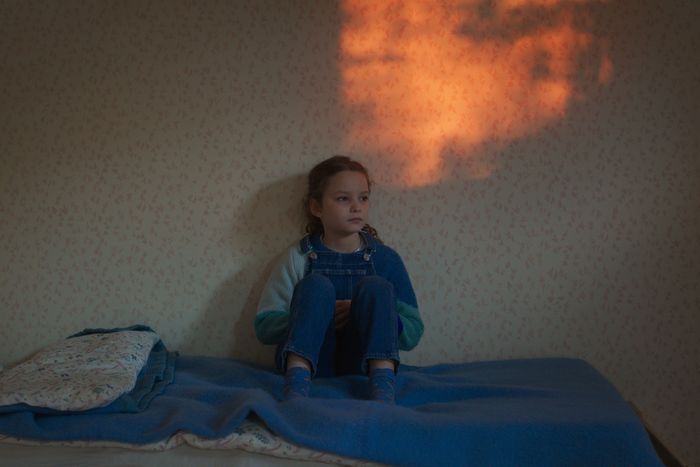
“You never tell me about when you were children,” 8-year-old Nelly (Joséphine Sanz) complains to her father (Stéphane Varupenne) one evening over dinner (for her) and a cigarette (for him) in Petite Maman. Her father, who’s credited simply as that, protests that he and her mom talk about their youth all time. She counters that they only tell her “little stories,” like “Christmas presents you had, or if you loved pizza,” when what she wants is the real stuff, the details that would give her a genuine sense of what her parents were like when they were her age. She wants to know what they were afraid of, and her dad, understanding what she’s asking for, whispers to his daughter a secret she accepts like a gift: “I was scared of my father.”
Petite Maman, the new feature from Portrait of a Lady on Fire’s Céline Sciamma, doesn’t feel small so much as it feels scaled to the size of its young protagonist. At 72 minutes long, it’s a perfect creation in miniature, one that doesn’t have a wasted frame but that also never feels like it’s in a rush. There’s always room for moments like the one that ends that scene, as Nelly regards her father appreciatively for a beat, as though the information he shared with her allowed her to perceive in him the boy he used to be. Petite Maman is a film about parental relationships, but its perspective, without any mawkishness, is that of a child gazing up at the adults in her life and trying to parse behavior that she finds inscrutable. Nelly loves but struggles to understand her mother (Nina Meurisse) in particular, a woman who’s prone to bursts of melancholy, and who abruptly leaves a few days into their trip to clean out her childhood home following the death of Nelly’s maternal grandmother.
The mechanics of Sciamma’s film are simple, but they’re realized so delicately, and with the help of such unaffected child performances, that they feel miraculous. Entertaining herself in the woods outside the house after her mother’s departure, Nelly encounters another little girl (Gabrielle Sanz), who introduces herself as Marion. That’s Nelly’s mother’s name, but it’s not until the two go back to Marion’s home, and Nelly sees the house as it once was, that she understands she’s experiencing an inexplicable act of time travel. “You come from the future?” Marion asks. “I come from the path behind you,” Nelly informs her, and that’s as much curiosity as the two want to spare for the unassuming stroke of the fantastic they’ve encountered. Neither they nor the movie are all that interested in the why — what matters is how the characters interact when placed on the same level and allowed to interact in a less complicated mode.
Gabrielle and Joséphine Sanz are twins, and when they play together, it can feel so natural that they seem to forget they’re being observed. Both are prone to solemnity, but have bright smiles that can break out like the sun from behind clouds, and both have an endearingly Chaplin-esque toddle to their walk. Sciamma, working again with Portrait of a Lady on Fire cinematographer Claire Mathon, sometimes allows the sisters to play in a wide static frame, either together or apart, as though to better capture the secluded mind-set of childhood. As Nelly and Marion giggle together over the process of making pancakes, or pull out a board game, they embody the instant intimacy only kids are capable of, while also reaching a deeper understanding that’s the stuff of fantasy. As an adult, Marion has moods and things she doesn’t share, while as a child, she’s direct about her uncertainty about an impending surgery, her dreams of becoming an actor, and her insistence that she be serenaded more than once for her birthday.
If Portrait of a Lady on Fire was grand in its emotions to a fault, Petite Maman feels intended to balance that swooning maximalism out with its appreciation of tiny gestures and quiet conversations. When the girls curl up and whisper together during a sleepover, trying to figure out the adult Marion becomes, it’s devastating — the clarity of Nelly’s concerns about causing her mother’s unhappiness, and Marion’s certainty that Nelly isn’t at fault. Petite Maman has the golden tone of a late-autumn afternoon, all changing leaves and woolen layers, but it doesn’t deal in nostalgia. It returns Marion to childhood only so Nelly can perceive her differently, and can indulge, however briefly, in being her playmate, these two grave-faced only children getting company through unexplained magic.
More Movie Reviews
- The Accountant 2 Can Not Be Taken Seriously
- Another Simple Favor Is So Fun, Until It Gets So Dumb
- Errol Morris Has Been Sucked Into the Gaping Maw of True Crime


